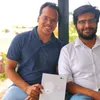How healthtech startup Dozee is upgrading India’s critical care infrastructure
In a recent Prime Venture Podcast, Dozee Co-Founders Mudit Dandwate and Gaurav Parchani share their founding and growth story. They talk about the time they acted as guinea pigs for Dozee, how they took an idea to a product, the challenge of convincing doctors, data privacy issues, and more.
Mudit Dandwate and Gaurav Parchani, mechanical engineers from IIT, were working in the same automotive company when they met and connected over their love for sensors. Both liked their jobs but “wanted to start something that added value to society”.
Healthcare came up as the obvious choice and the two engineers started studying the obsolete technology of ballistocardiography. After much thinking, Mudit and Gaurav decided to build a device that would track the vibrations of the human body and return data on vitals like heart and lung function.
Over time, this paved the way for a futuristic “one-of-its-kind continuous remote health monitoring service” called .
From idea to product
Mudit says Dozee was built in stages. The first phase was all about building a prototype.
Even when the science was there, “establishing how you can give medical care without even touching a person” was the real challenge for Mudit and Gaurav.
While Mudit took care of the hardware, Gaurav worked on the algorithms. Every time they came up with a prototype, they would test the device on themselves.
“Hardware is tough. Hardware in healthcare is even more tough,” Gaurav says.
After spacetech, healthcare is the most regulated market in India, and getting every compliance right was a bit of a challenge.
In Stage 2, the duo worked on convincing people that Dozee actually worked, even though sensors were placed under the mattress. Lastly, it was about raising capital to keep the company alive and moving the product into the market.
Dozee’s trial stage
NIMHANS was one of the first institutions that had allowed Mudit and Gaurav to test their product in a hospital setting. But convincing them was not easy.
Mudit says, “You have to keep on pitching. At the end, you will only require one or two to start with.”
That is how they learnt of NIMHANS’s problem of collecting data from their sleep labs. NIMHANS wanted to automate the system and the technology did not exist until Dozee came along.
Gaurav says the healthcare industry is just like any other sector; some people will believe in you while others will not even look at you.
Dozee had to deal with doctors who were short on time, to begin with, and it took a lot of convincing to find someone who would show interest. Mudit and Gaurav would give live demos to the interested doctors, and their trial phase “involved a lot of leg work”.
The ‘AHA’ moments
Mudit and Gaurav credit their dog, Pi, for Dozee’s first breakthrough moment. Their initial thought was to attach sensors on the top of the mattress. Pi, then a puppy, had a habit of chewing everything. To prevent Pi from chewing their first prototype, Mudit and Gaurav left the product under the bed while going out for an afternoon tea.
“[We] came back. He was sleeping over the mattress directly over the sensor. And then I observed there were minute heartbeats on the data,” Gaurav says. That is how the idea of placing sensors under the mattress came to the duo.
The second breakthrough moment, Mudit says, was their first live save. One of their products went to a woman whose mother was suffering from cardiac problems. Dozee correctly predicted the anomalies in the mother’s heartbeats and helped the doctor to recommend the use of a pacemaker. “It was a big moment for us,” Mudit says.
The path ahead
“Today, we are present in over 270 hospitals across almost 40 cities and towns across India. In next 12 months, we are looking to go even deeper and scale up to 3,000 hospitals across India,” Mudit says.
The team wants to set up remote monitoring systems in Tier 2 hospitals. Both Mudit and Gaurav feel the need there is “more than the top hospitals in metros and Tier 1”.
To know more, listen to the podcast here
Timestamps
01:12 - What got Mudit and Gaurav started with Dozee?
12:00 - Discovery phase and eureka moments!
23:15 - Early adopters and moments of surprise
30:45 - Creating impact and scaling Dozee during COVID
54:35 - Regulations and permissions for healthcare entrepreneurs
Edited by Teja Lele









